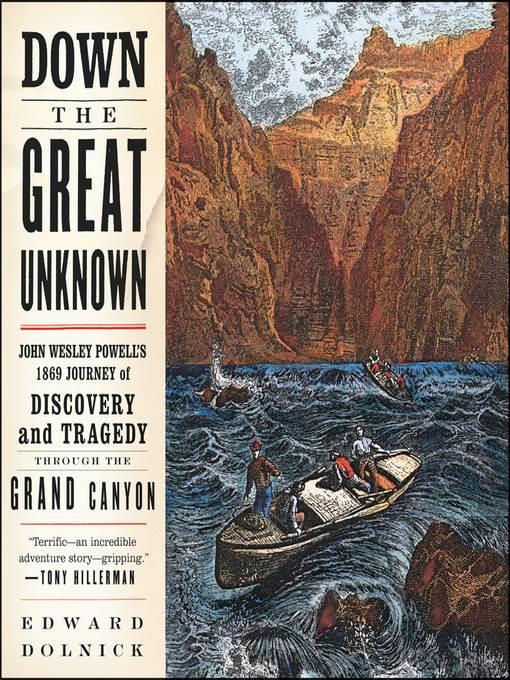
Down the Great Unknown
John Wesley Powell's 1869 Journey of Discovery and Tragedy Through the Grand Canyon
کتاب های مرتبط
- اطلاعات
- نقد و بررسی
- دیدگاه کاربران
نقد و بررسی

September 10, 2001
Powell led his band of stalwart trappers and ex-soldiers down the Green River in Wyoming Territory, heading for the last bit of terra incognita in the U.S.: the Colorado River and the Grand Canyon. The expedition had plenty of supplies, but the wrong type of boats for shooting rapids. Moreover, their inexperience with rapids cost them one of the boats and many provisions. There was little game to supplement their rapidly dwindling food supply. And being the first to chart the river, they didn't know what lay beyond each twist. These handicaps, along with deadly river rocks, soaring canyon walls and one-armed Powell's impressive feat of scaling them to measure their height, make for a remarkable journey. Unfortunately, Dolnick does the story a disservice in overwriting the expedition's slower moments. He frequently overexplains, and he never meets a simile he doesn't like. Every description, no matter how effective, is carried too far, suggesting Dolnick doesn't trust his story or his readers: "rapids... do not murmur. They rumble. They roar. They crash. The sound evokes a thunderstorm just overhead, a jet skimming the ground, a runaway train.... The message is worse than the sound itself—the roar of a rapid is a proclamation of danger as clear as a giant's bellowed curse in a fairy tale." After passages like that, readers may want to jump ship, or like Powell's band, they can struggle through and emerge battered but illuminated. Photos and illus. (Oct. 2)Forecast:Will a 15-city NPR campaign, six-city author tour and big-time advertising help the story trump the writing? Yes. The adventure is that good.

October 1, 2001
On May 24, 1869, John Wesley Powell and a band of nine volunteer frontiersmen embarked from Green River Station, Wyoming Territory, in four wooden boats. The one-armed Union veteran and geology professor set out to explore the uncharted Green and Colorado rivers and pass through the mysterious Grand Canyon, reaching his destination at the mouth of the Virgin River in Arizona in late August. To research this journey, former Boston Globe science writer Dolnick relied on Powell's river and postexpedition diaries and his crew's journals. These accounts reveal the friction between the overbearing Powell and his independent mountain men, which resulted in defections and the mysterious disappearance of three crew members. Dolnick's study offers excellent descriptions of the riverine obstacles, the inadequacy of the boats employed, the back-breaking tasks of lining and portaging, the constant threat of death from starvation and hostiles, and the wildly speculative press accounts. The author's liberal use of corroborative testimony from contemporary whitewater professionals may, however, prove distracting. Dolnick's concluding chapter shows how Powell's eventual campaign of self-promotion both secured for him a place in history and effectively eclipsed (by design) the amazing contributions of his men. Recommended for Western collections and all libraries. [For a fictional account of Powell's sojourn, see John Vernon's The Last Canyon, p. 144. Ed.] John Carver Edwards, Univ. of Georgia Libs., Athens
Copyright 2001 Library Journal, LLC Used with permission.

September 15, 2001
John Wesley Powell wrote about his descent of the Colorado River canyons in 1869 in " Explo"r" ation of the Colorado River," now considered a classic in discovery annals. Dolnick, a science journalist who has rafted down the Grand, turns in a most estimable rendition of that storied expedition. It skillfully integrates the notes and journals of expedition members with technical insight about the perils of roiling whitewater. At present, some rapids, in particular those not affected by the building of dams, are nearly identical, boulder-for-boulder, to what Powell and his nine men encountered--with the difference that they could not know what dangers lay ahead, as today's rafting guides do. The expedition's embodiment of adventure and courage gives it a timelessness that Dolnick positively reinforces with well-detailed characterizations of the expedition members and their motivations and dissensions. Dolnick's account will no doubt be popular, and libraries should consider ordering as well the recent full-scale biography of Powell, " A River Running "West, by Donald Worster [BKL Ja 1 & 15 01].(Reprinted with permission of Booklist, copyright 2001, American Library Association.)

























دیدگاه کاربران